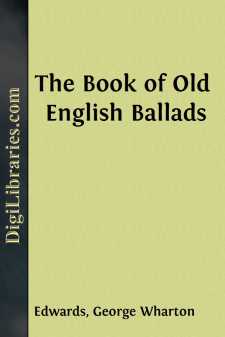Categories
- Antiques & Collectibles 13
- Architecture 36
- Art 48
- Bibles 22
- Biography & Autobiography 813
- Body, Mind & Spirit 142
- Business & Economics 28
- Children's Books 15
- Children's Fiction 12
- Computers 4
- Cooking 94
- Crafts & Hobbies 4
- Drama 346
- Education 46
- Family & Relationships 57
- Fiction 11828
- Games 19
- Gardening 17
- Health & Fitness 34
- History 1377
- House & Home 1
- Humor 147
- Juvenile Fiction 1873
- Juvenile Nonfiction 202
- Language Arts & Disciplines 88
- Law 16
- Literary Collections 686
- Literary Criticism 179
- Mathematics 13
- Medical 41
- Music 40
- Nature 179
- Non-Classifiable 1768
- Performing Arts 7
- Periodicals 1453
- Philosophy 64
- Photography 2
- Poetry 896
- Political Science 203
- Psychology 42
- Reference 154
- Religion 513
- Science 126
- Self-Help 84
- Social Science 81
- Sports & Recreation 34
- Study Aids 3
- Technology & Engineering 59
- Transportation 23
- Travel 463
- True Crime 29
The Book of Old English Ballads
Categories:
Description:
Excerpt
Introduction
Goethe, who saw so many things with such clearness of vision, brought out the charm of the popular ballad for readers of a later day in his remark that the value of these songs of the people is to be found in the fact that their motives are drawn directly from nature; and he added, that in the art of saying things compactly, uneducated men have greater skill than those who are educated. It is certainly true that no kind of verse is so completely out of the atmosphere of modern writing as the popular ballad. No other form of verse has, therefore, in so great a degree, the charm of freshness. In material, treatment, and spirit, these bat lads are set in sharp contrast with the poetry of the hour. They deal with historical events or incidents, with local traditions, with personal adventure or achievement. They are, almost without exception, entirely objective. Contemporary poetry is, on the other hand, very largely subjective; and even when it deals with events or incidents it invests them to such a degree with personal emotion and imagination, it so modifies and colours them with temperamental effects, that the resulting poem is much more a study of subjective conditions than a picture or drama of objective realities. This projection of the inward upon the outward world, in such a degree that the dividing line between the two is lost, is strikingly illustrated in Maeterlinck's plays. Nothing could be in sharper contrast, for instance, than the famous ballad of "The Hunting of the Cheviot" and Maeterlinck's "Princess Maleine." There is no atmosphere, in a strict use of the word, in the spirited and compact account of the famous contention between the Percies and the Douglases, of which Sir Philip Sidney said "that I found not my heart moved more than with a Trumpet." It is a breathless, rushing narrative of a swift succession of events, told with the most straight-forward simplicity. In the "Princess Maleine," on the other hand, the narrative is so charged with subjective feeling, the world in which the action takes place is so deeply tinged with lights that never rested on any actual landscape, that all sense of reality is lost. The play depends for its effect mainly upon atmosphere. Certain very definite impressions are produced with singular power, but there is no clear, clean stamping of occurrences on the mind. The imagination is skilfully awakened and made to do the work of observation.
The note of the popular ballad is its objectivity; it not only takes us out of doors, but it also takes us out of the individual consciousness. The manner is entirely subordinated to the matter; the poet, if there was a poet in the case, obliterates himself. What we get is a definite report of events which have taken place, not a study of a man's mind nor an account of a man's feelings. The true balladist is never introspective; he is concerned not with himself but with his story. There is no self-disclosure in his song. To the mood of Senancour and Amiel he was a stranger....




